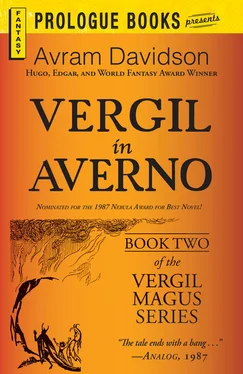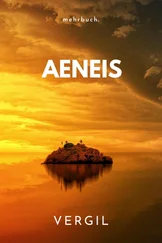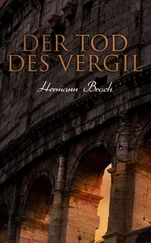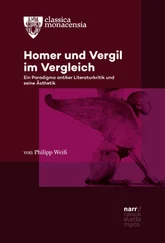Avram Davidson - Vergil in Averno
Здесь есть возможность читать онлайн «Avram Davidson - Vergil in Averno» весь текст электронной книги совершенно бесплатно (целиком полную версию без сокращений). В некоторых случаях можно слушать аудио, скачать через торрент в формате fb2 и присутствует краткое содержание. Жанр: Фэнтези, на английском языке. Описание произведения, (предисловие) а так же отзывы посетителей доступны на портале библиотеки ЛибКат.
- Название:Vergil in Averno
- Автор:
- Жанр:
- Год:неизвестен
- ISBN:нет данных
- Рейтинг книги:3 / 5. Голосов: 1
-
Избранное:Добавить в избранное
- Отзывы:
-
Ваша оценка:
- 60
- 1
- 2
- 3
- 4
- 5
Vergil in Averno: краткое содержание, описание и аннотация
Предлагаем к чтению аннотацию, описание, краткое содержание или предисловие (зависит от того, что написал сам автор книги «Vergil in Averno»). Если вы не нашли необходимую информацию о книге — напишите в комментариях, мы постараемся отыскать её.
Vergil in Averno — читать онлайн бесплатно полную книгу (весь текст) целиком
Ниже представлен текст книги, разбитый по страницам. Система сохранения места последней прочитанной страницы, позволяет с удобством читать онлайн бесплатно книгу «Vergil in Averno», без необходимости каждый раз заново искать на чём Вы остановились. Поставьте закладку, и сможете в любой момент перейти на страницу, на которой закончили чтение.
Интервал:
Закладка:
Armin, all eyes at the work of sorting the jewel-stones, and at the show of the sparkles themselves, seemed to have heard nor seen nothing of this brief scene. Visitor learned and distinguished, and nephew, exchanged glances. Nephew gestured a diadem round about his head. Visitor gestured yes. Nephew gestured silence. Visitor gestured assent.
After a moment more, visitor said, “I am quite convinced.”
Armin blinked, tugged his glance away and over. “You see. Wonderful. Well. Thank you, merchants, we would stay longer, save it is quite late.”
“How regrettable; still, I must yield,” the nephew murmured. In a few moments the doors and their lockings and unlockings lay behind them; and before, the street.
Often Vergil was to ponder, does a true king of fools wear a crown of true jewels? He could find not one reason to say yes; when he said no, upon the heels of that answer came yet another question, equally brief: why?
It was long and long till answer came to him.
Vergil paced up and down his private room, charts here and lists there. He had no need of globes, and had he, there were (back in his place in the port) only small ones. Automatically, as this thought recurred, came the dream. Someday I shall have one as large, quite as large, as that of Crates of Miletus. . if not larger! . . But this, as other dreams, went fading away. It was preposterous — was it not? Was it not absurd? — it was! It had been so simple, though he had not then considered it so simple: Aurelio had come to him and said, “Master Vergil, if so be your rules and practice don’t forbid you should work for a freedman, I should like to ask you, Master Vergil: Will you build me a house?”
Here he seemed under the control of a severalty of freedmen. Nothing was simple, no one condescended to him, few were even barely civil, he scarcely knew what it was that was wanted, or what the chances were of accomplishing even what he thought might be wanted. . or, at any rate, what might be done. Could be done. Might be. Might. If …
He might build for them an aqueduct, an eighth wonder of the world, through which might run hot water instead of cold. Might. Did, really, the magnates want him to study such things as the flow, the times, the force, of the up-gush of the steamy jets and gusts? Or did they want, and only want, some way to bribe. . or did they, even, think: trick? . . “The good gods of hell”. . Were they as scholars who truly wanted to learn how a thing be done, that they might do it (might)? or were they as those who desired only that others do a thing, that they themselves receive a benefit? Regardless of how . . could. . would. . might. Might.
That night the king could not sleep. These words Vergil clearly recalled having read somewhere, in a text whose Greek was a bit different from the usual; he recalled, too, having had reason to believe it to have been a translation, but no more did he remember.
That night the madman whom populace and magnates alike together had declared to be their king danced and chanted as he danced in the mud and muck of the mule market, and danced with golden armils; and danced as never had Vergil seen man dance before. And the harlots of the place and the (supposedly) chastest matrons did not hold back from dancing with him when he mimed and beckoned them to do so.
“This is life, Master Vergil!” A voice, Armin’s voice, spoke, so near his neck he could feel the warmth of the breath. White slaves and black held links and torches to enlighten the scene, magnates black and magnates white shook the sistrum, and the shrill chittering of the instrument, elsewhere sounded only for some sacred ceremony, and the shriller piping of the rude reed flutes seemed to send shocks through Vergil’s limbs and joints, urging him on to join the insane dance. But he felt he somehow must not, he thought of Ulysses bound to the mast whilst the sirens sang (and what song had the sirens sung? was it beyond conjecture? was it not, must it not have been, much like this? who knew but what the sirens might have danced as well. . as well as sung …): no, no: he must not dance.
Shut his eyes, he might, shut his ears he could not do; he did what he might and therefore shut his eyes, conjectured vision of things other. Clouds floated past mountains, and the dark trees raked them as the spikes of teasels combing fleeces of white wool, and -
“Life! Life!” the voice in his ear. “The Emperor may tax, and build ships and roads and wage war and make peace and mint coins and be carried in a litter from one palace or one temple to another; can he dance like this? Eh?”
“No.”
The answer gave, evidently, great satisfaction. “Then we need him not! For what? Not! Away with him, and off with his — ” The last word was not heard, perhaps was not uttered; Armin with a great shout tore off his outer robe (it was crimson, and woven with a pattern of stars and flowers in gold and white and in an off-white), which fell at once into the thick mire and stench of the market ground, and Armin leapt forward, and snapping his fingers and prancing high, he advanced before the king and took a hand of the woman dancing with the king and took the hand of the king and they danced, and they all danced and the tambours beat. The sistrum chittered and the reed flute shrilled and the tambours beat. And the tambours beat.
But Vergil very slowly withdrew. He had tried to think of other things, and, in much measure, he had. Consider the powers of the winds. What were winds but airs in motions, might not the very airs be harnessed? What was sailing, else? Molded? Might one not make a mill empowered by air? Might one not make a bridge of air? A wall? He cast his thoughts abroad into the fetid nightlike sounds; echo answered: might. Vergil very slowly withdrew and clum a flight of stairs and went along an upper colonnade away. This (these, for they proceeded quite a ways) system of walkways was not deserted, late though was the hour, but all who were there were leaning over the balustrade and looking, singing, shouting, clapping with their hands a distinctive rhythm; no one noticed one who walked slowly along and away.
In his room. “This is madness. To assume a royal title without Imperial permission, this is treason. Cadmus is mad, this is no thing new; but now half the city seems mad as well.”
“Yes.”
Vergil turned; he saw Armin stepping through the low window that he had just now opened for a last breath of (what locally passed for) air — he saw the same man who had not a half a sandglass ago gone leaping out to dance insanely. Armin looked nothing as he said one syllable, that yes, then he grinned, and it was neither a madman’s grin nor was it nothing. Vergil could not really bring himself to grin, nor even smile, but somewhat he relaxed. And, almost, he smiled.
“Well, my guest, how may I serve?”
His guest muttered, “I should have sate upon the sill, and not. . How serve? With water to wash my filthy feet. You need not — I hasten — think I mean you to wash them yourself, neither ought you, really, to call a servant, for they are surely by now all a-dancing in the mule market; may I take your consent for me to pour myself water? — this time I shall sit upon the sill!” He stooped, ladled, poured. His face puckered. “Hercules! Me Here, how it stinks! No mud and no stench like the mud of our mule market. . and then. . I do presume, but. . and then I should be grateful for something to toss over my tunicle, for my garment I did not truly care to retrieve.”
Vergil tossed him a robe of local cut (a gift, one among many), and Armin caught it and threw it on. “Why did you dance there, then?” asked Vergil.
Читать дальшеИнтервал:
Закладка:
Похожие книги на «Vergil in Averno»
Представляем Вашему вниманию похожие книги на «Vergil in Averno» списком для выбора. Мы отобрали схожую по названию и смыслу литературу в надежде предоставить читателям больше вариантов отыскать новые, интересные, ещё непрочитанные произведения.
Обсуждение, отзывы о книге «Vergil in Averno» и просто собственные мнения читателей. Оставьте ваши комментарии, напишите, что Вы думаете о произведении, его смысле или главных героях. Укажите что конкретно понравилось, а что нет, и почему Вы так считаете.












